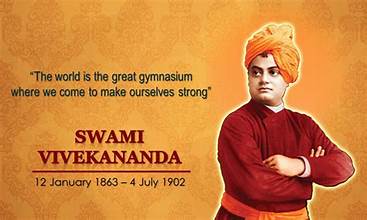Swami Vivekananda, a towering figure in the history of modern India, is celebrated for his profound contributions to spiritual thought and social reform. His death anniversary is a momentous occasion to honor his legacy, reflect on his teachings, and understand his impact on the world. In this comprehensive article, we delve deep into the life and achievements of Swami Vivekananda, providing an enriched perspective on his enduring influence.
Early Life and Spiritual Awakening
Swami Vivekananda was born Narendranath Datta on January 12, 1863, in Kolkata, India. From a young age, he exhibited an insatiable curiosity and a keen intellect. His education at the Scottish Church College introduced him to Western philosophy, science, and history, which he later synthesized with the rich spiritual heritage of India.
Meeting with Ramakrishna Paramahamsa
A turning point in Vivekananda’s life came when he met Ramakrishna Paramahamsa, a mystic and spiritual teacher, in 1881. This encounter ignited a profound transformation in him. Ramakrishna’s teachings and spiritual practices deeply influenced Vivekananda, leading him to embrace a life of renunciation and spiritual pursuit. Under Ramakrishna’s guidance, Vivekananda experienced spiritual enlightenment, which laid the foundation for his future endeavors.
The Journey to the West
Swami Vivekananda is perhaps best known for his groundbreaking address at the Parliament of the World’s Religions in Chicago in 1893. His eloquent speech, beginning with the iconic words, “Sisters and Brothers of America,” captivated the audience and established him as a leading proponent of interfaith dialogue and religious tolerance.
Impact in the United States and Europe
Vivekananda’s lectures in the United States and Europe introduced Western audiences to the profound spiritual traditions of India. He emphasized the universality of all religions and the importance of self-realization and service to humanity. His teachings resonated with many, leading to the establishment of Vedanta societies in various cities. These societies played a crucial role in spreading his message and fostering cross-cultural understanding.
Founding the Ramakrishna Mission
Upon his return to India, Swami Vivekananda founded the Ramakrishna Mission in 1897. This organization was dedicated to the twin ideals of “Atmano Mokshartham Jagad Hitaya Cha” (For one’s own salvation and for the welfare of the world). The mission focused on spiritual development, education, and social service. It established schools, colleges, hospitals, and orphanages, significantly contributing to the upliftment of society.
Philosophy and Teachings
Vivekananda’s philosophy is a synthesis of Vedantic spiritualism and practical Vedanta. He believed in the potential divinity of every individual and advocated for the realization of this divinity through selfless service, meditation, and knowledge. His teachings emphasized the oneness of existence, the divinity of the soul, and the harmony of religions.
Legacy and Influence
Swami Vivekananda’s impact extends far beyond his lifetime. His vision of education as a means of character building and societal development has inspired countless individuals and institutions. His call for the upliftment of the masses and the empowerment of women resonated with social reformers and leaders worldwide.
Influence on Indian Nationalism
Vivekananda’s ideas significantly influenced the Indian independence movement. Leaders like Mahatma Gandhi, Subhas Chandra Bose, and Jawaharlal Nehru drew inspiration from his teachings. His emphasis on self-reliance, national pride, and cultural revival played a crucial role in shaping the ethos of modern India.
Global Spiritual Influence
Internationally, Vivekananda’s message of universal brotherhood and spiritual unity continues to inspire. His works are studied and revered by spiritual seekers and scholars around the world. Institutions like the Ramakrishna Math and Mission continue to propagate his teachings, ensuring that his legacy endures.
Commemorating His Death Anniversary
Swami Vivekananda passed away on July 4, 1902, at the age of 39. His death anniversary is observed with reverence and reflection. It is a time to revisit his teachings, contemplate his contributions, and renew our commitment to his ideals.
Reflection on His Teachings
On this solemn occasion, followers and admirers of Swami Vivekananda engage in various activities such as meditation, discussions, and reading his works. His teachings on selflessness, spiritual growth, and social service serve as a guiding light for many.
Continuing His Mission
The Ramakrishna Mission, along with numerous other organizations and individuals, continues to carry forward Swami Vivekananda’s mission. Through educational programs, healthcare services, and spiritual guidance, these efforts embody his vision of a harmonious and enlightened society.




